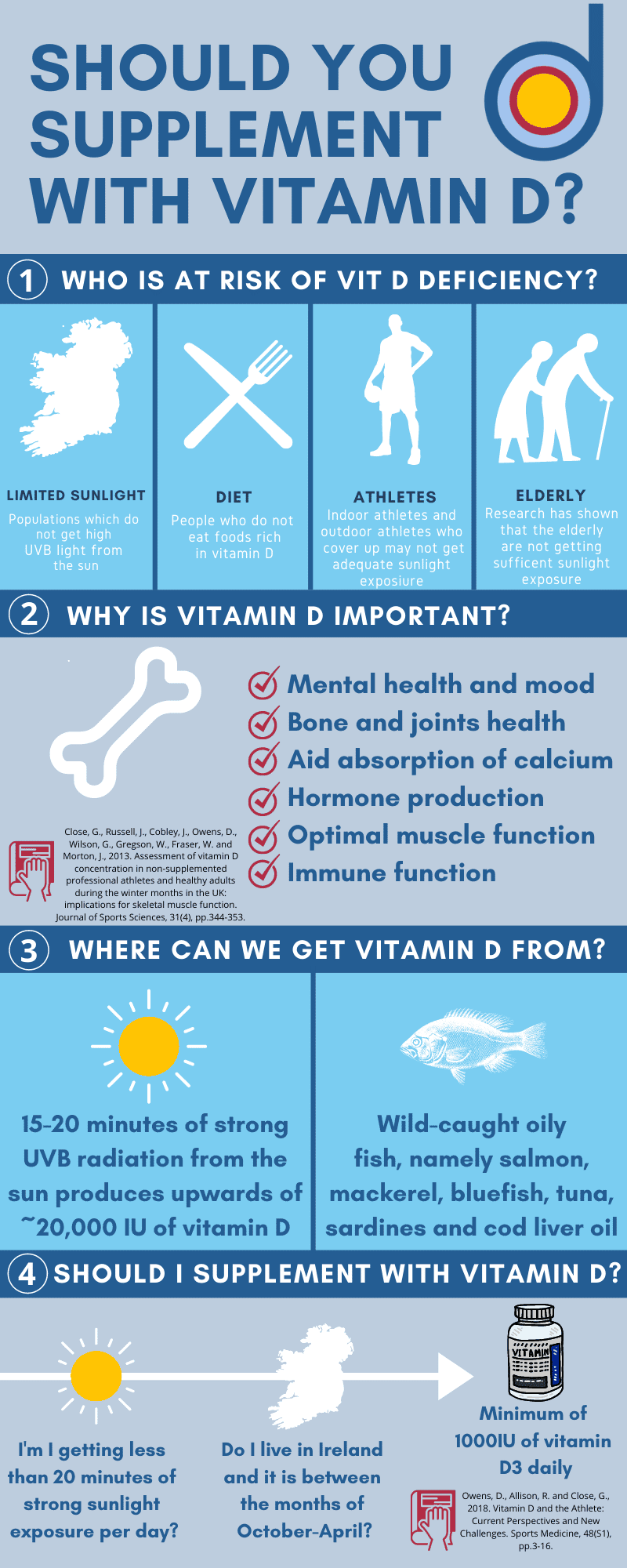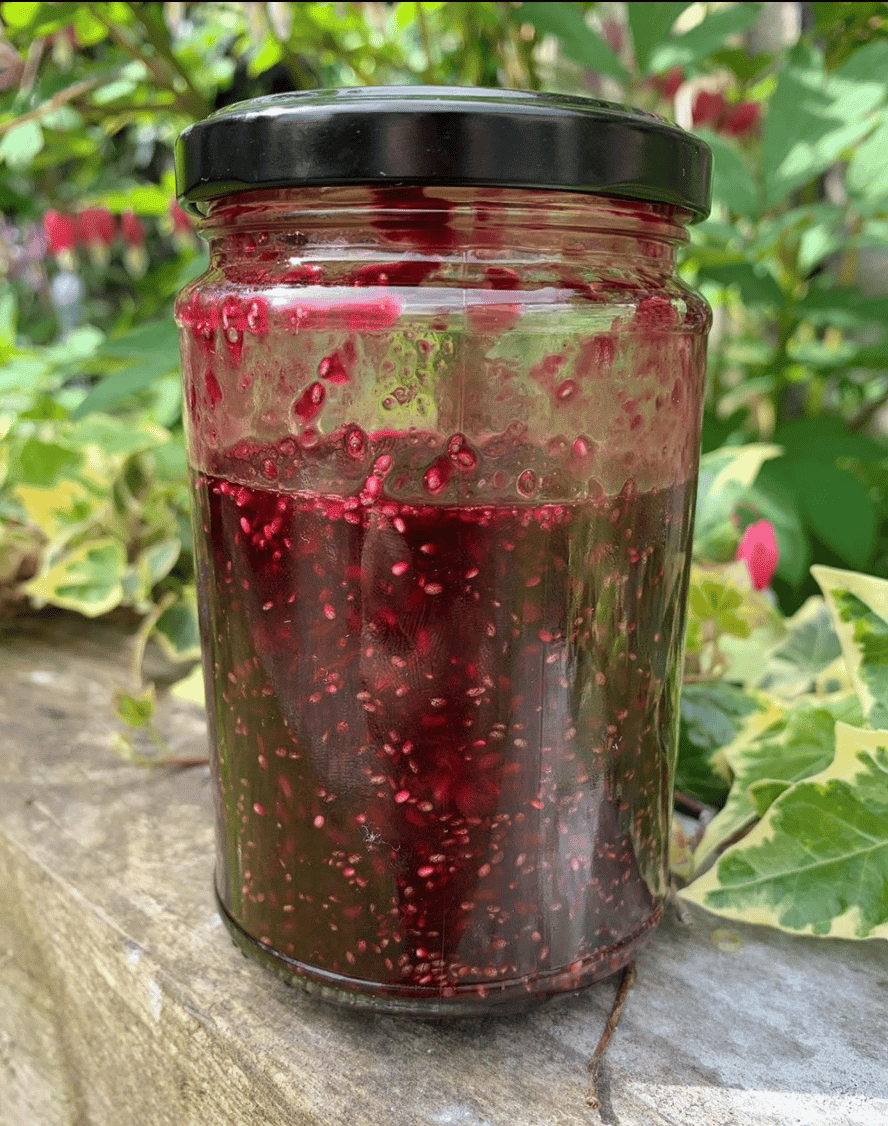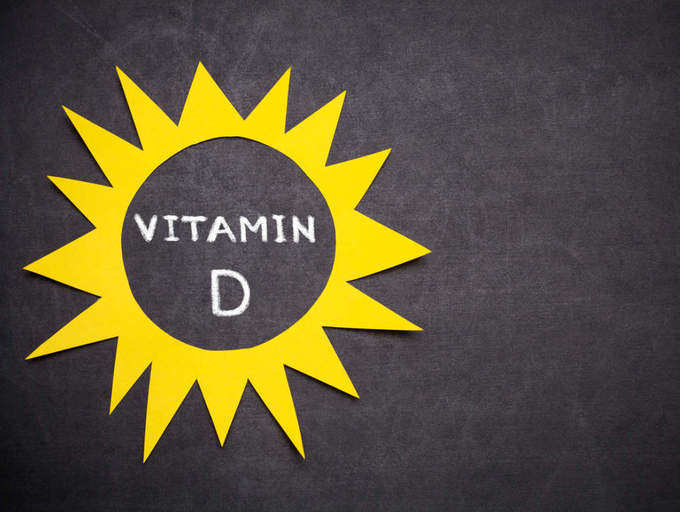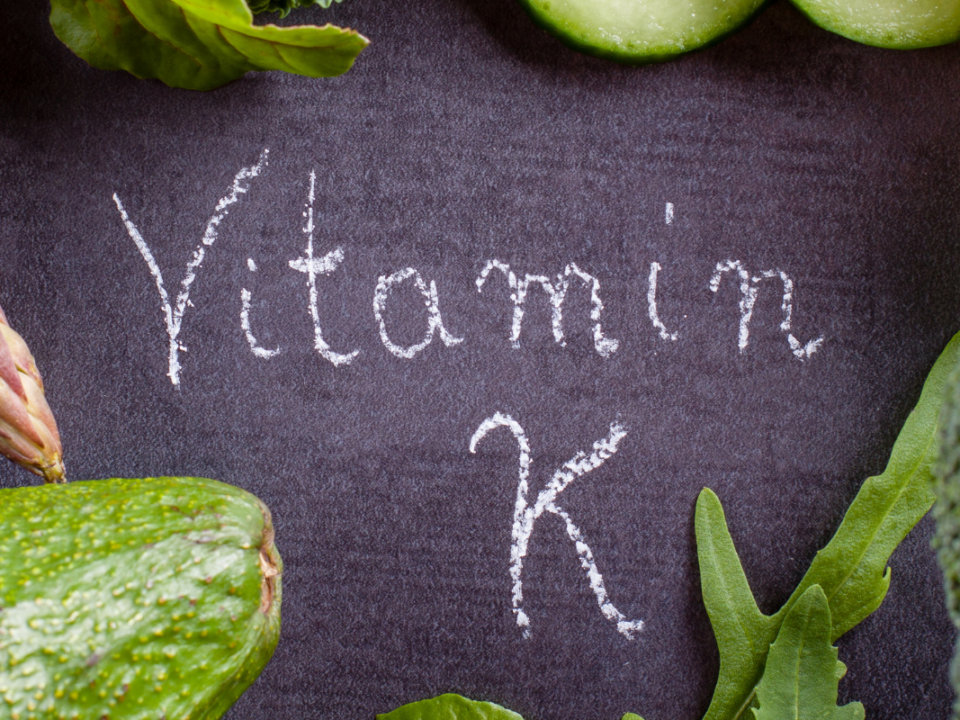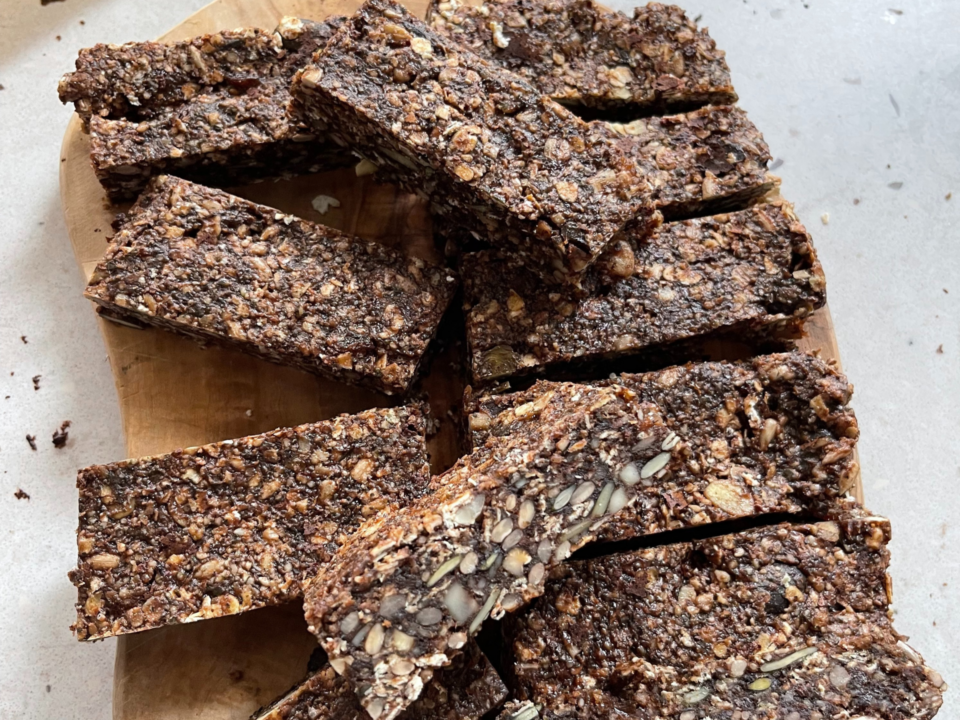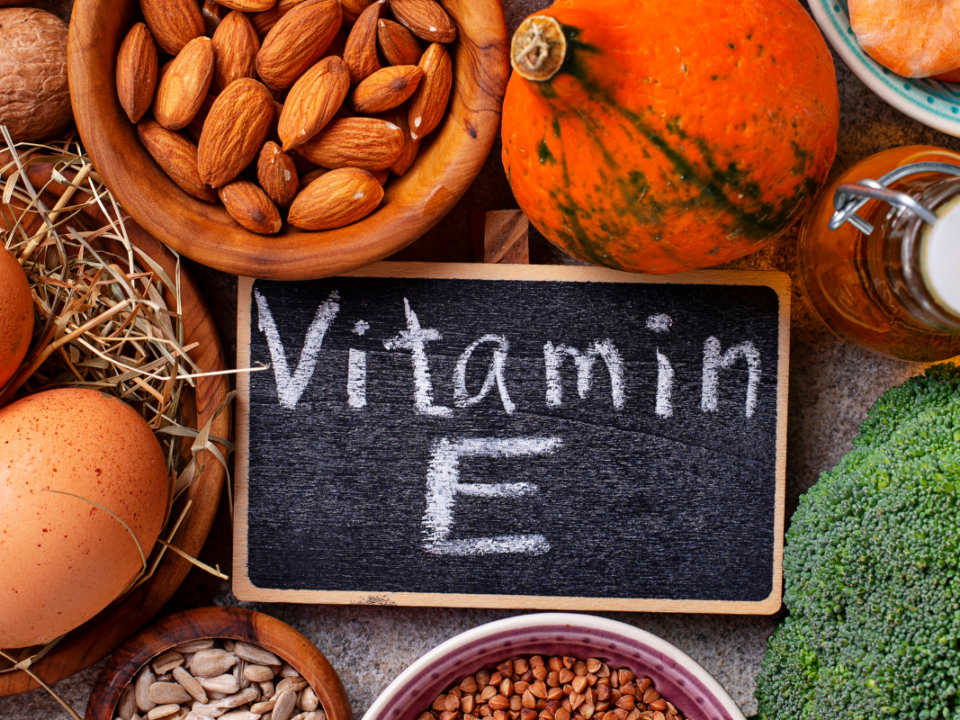Vitamin D – The sunshine vitamin
Summary
- Vitamin D is a key nutrient needed to support our health
- Supplementation during the latter half of the year is recommended
Introduction
This time of year, people are often keen to know if there is a specific food that they should eat or a supplement that they take in order to help them strengthen their immune system or improve their overall health. I am a strong believer that people can get the vast majority of their essential nutrients from a balanced and varied diet based on the consumption of whole, natural and unprocessed foods, but there is at least one exception to that – vitamin D.
In recent years vitamin D, often referred to as the ‘sunshine vitamin’, has been one of the most talked about supplements in health-related media due to an ever-increasing body of evidence describing relative deficiencies in certain populations, and benefits of supplementation in others. Researchers are still trying to establish exactly how much vitamin D we require from the diet and whether we should be supplementing with it during the winter months. There is no doubt that in certain parts of the world due to climate, environmental, dietary and cultural factors, relative vitamin D deficiency is common and should be taken in supplement form to meet the body’s requirement. So, what about Ireland: do we need to supplement with vitamin D in the winter months and if so how much is enough or too much?
 What is Vitamin D?
What is Vitamin D?
Vitamin D is a fat-soluble vitamin that is also known to act as a lipophilic pro-hormone. Vitamin D can be obtained from the diet, but the primary source is synthesised in skin when exposed to ultraviolent-B (UVB) radiation from the sun. When ultraviolet light from the sun hits the leaf of a plant, a molecule known as ergosterol is converted into ergocalciferol, or vitamin D2, whereas when ultraviolet light hits the cells of our skin, it is converted into cholecalciferol, a form of vitamin D3. Under normal circumstances, in response to regular sun exposure during the summer months (May to September), the body will synthesise sufficient vitamin D to meet its needs. However, during the winter months, the ultraviolet rays are often not strong enough to allow our body to produce vitamin D. Hence, we rely entirely on dietary sources. Those not consuming sufficient vitamin D from their diet during the winter months (or lucky enough to get away on a tropical sun holiday!) have an obvious potential for deficiency.
 Why is vitamin D is important?
Why is vitamin D is important?
Vitamin D is required for multiple functions in the human body including calcium absorption, hormone production, optimum muscle function and the development of healthy bones and joints. The health-related implications of vitamin D deficiency continues to increase with a growing body of research over the past 10 years linking vitamin D deficiency to certain cancers, high blood pressure, cardiovascular disease, osteoarthritis and lowered immune function to name just a few. Another hugely important role vitamin D has is in mental health as vitamin D deficiency has been linked to symptoms of depression and seasonal affective disorder (SAD), which coincides with a drop in vitamin D levels during the winter months. It is not known if low vitamin D levels can cause depression but a relationship exists between low vitamin D levels and symptoms of depression. Either way, it is further evidence that vitamin D should be an important consideration in the diet.
 Vitamin D and the elderly
Vitamin D and the elderly
As we age, our muscle mass begins to waste and our strength declines year on year. This is known to be one of the reasons why the elderly are more prone to falls, fractures and certain diseases, and is a good motivation for you to continue to train for strength as well as aerobic fitness throughout your lifetime. Vitamin D plays an important role in muscle function and muscle strength and is hugely important for the elderly in particular. Research has shown that not only are elderly people not getting sufficient amounts of vitamin D from their diet but that they are less efficient at producing it from sunlight. Vitamin D deficiency is likely to be more prominent in the elderly because of decreased dietary intake, reduced sunlight exposure, decreased skin thickness and impaired intestinal absorption. For these reasons, older people should make a conscious effort to consume greater amounts of vitamin D containing foods and consider a vitamin D supplement in the winter months. In fact, supplementation with a combination of vitamin D and calcium has been repeatedly shown to reduce the incidence of falls and fractures in elderly people.
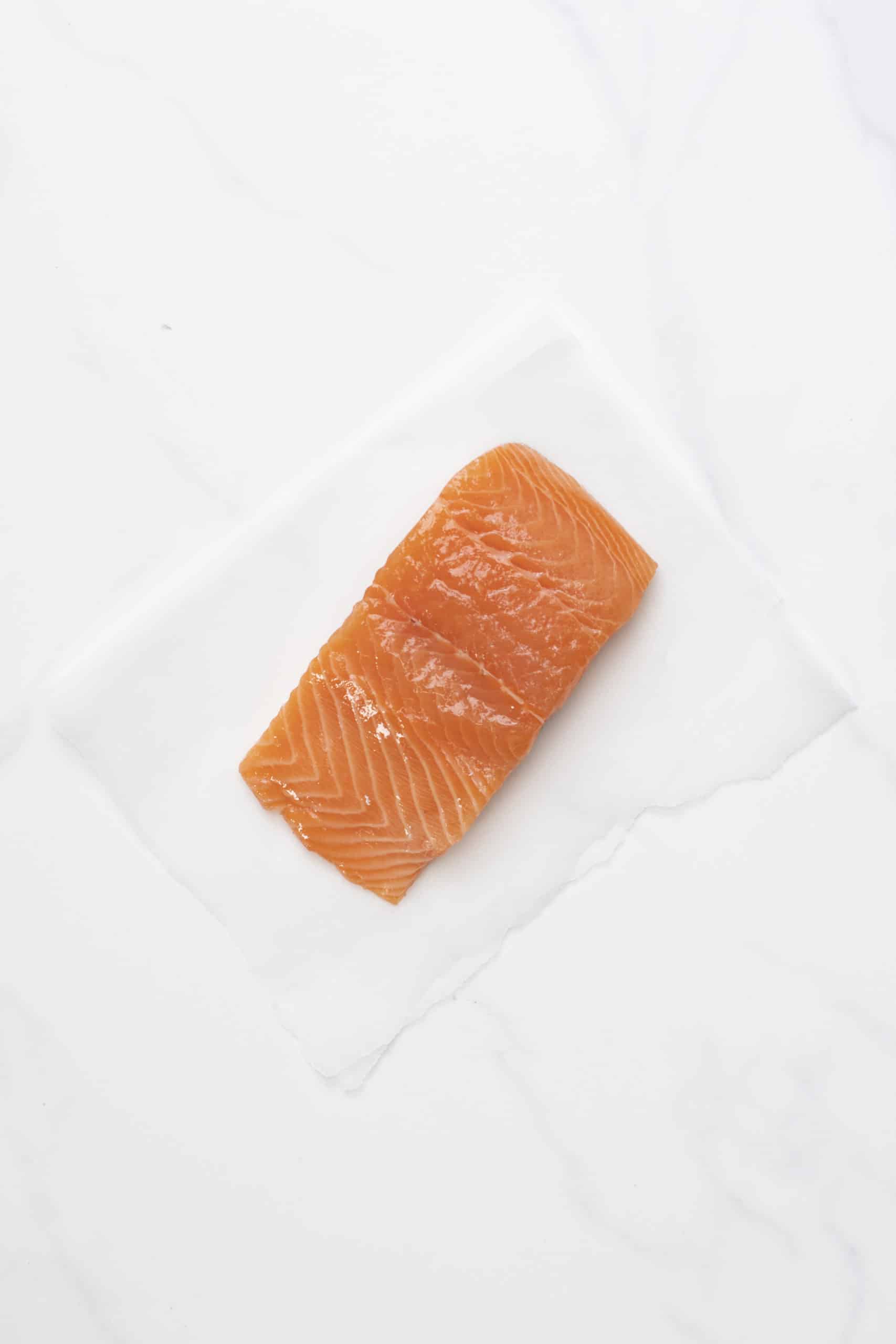 Vitamin D and your diet
Vitamin D and your diet
Our body is highly-efficient at producing sufficient vitamin D from the sun. For example, one full dose of UVB (15 to 20 minutes) from the sun produces upwards of ~20,000 IU of vitamin D, which equates to consuming well over a kg of fresh wild salmon. The recommended daily allowance (RDA) for vitamin D from the Institute of Medicine (IOM) has recently been revised upwards to 600 IU, or 15 μg. However, many researchers still believe this to be too low and advocate supplementation with higher doses anywhere between 1000 and 5000 IU daily during the winter months. A clear consensus has not yet been found.
Although more and more foods are being fortified with vitamin D, e.g. milk and cereals, most of these foods still contain only relatively small amounts. It would be difficult to consume sufficient vitamin D from these foods alone. The foods that naturally contain the richest source of vitamin D include wild-caught oily fish, namely salmon, mackerel, bluefish, tuna, sardines and cod liver oil. If you happen to be a person that hasn’t been exposed to much sunshine over the course of the year, you don’t eat vitamin D rich foods and you don’t take a multivitamin, then you are likely to require a vitamin D supplement during the later stages of the winter months.
The only way you can know for sure if you are deficient in vitamin D is to have your doctor test your blood levels. A practical and safe way to be sure you are getting sufficient vitamin D is by taking a vitamin D3 supplement daily until the late spring or early summer. This advice applied to people over the age of one. Vitamin D3 (cholecalciferol) is the most appropriate form to supplement with. Those with an overt vitamin D deficiency require much greater doses, so if you think you may be vitamin D-deficient, it is best to see your doctor and get your levels checked.

Vitamin D and COVID-19:
Researchers in Trinity College Dublin have recently encouraged people to increase their intake of foods rich in Vitamin D (liver, oily fish, eggs, fortified foods like dairy products and cereals) and to consider taking a Vitamin D supplement containing a minimum of 400IU (10ug) of vitamin D per day but higher intakes, closer to 20ug per day, may provide additional benefits. The report investigated the link between supplementation with Vitamin D and potential prevention of respiratory infections which is obviously quite topical given the current COVID 19 pandemic. At-risk groups may benefit from a supplement containing 600-800IU (15-20ug) of Vitamin D per day. Their full report can be found here.
Supplementing with Vitamin D status may help people, particularly those at high-risk, to maintain their overall health during the pandemic along with other recommended protective measures such as wearing a face covering, reducing social contacts and hand hygiene.
Other important factors for maintaining a healthy immune system include a varied and balanced diet, sufficient sleep, regular exercise and reducing stress and anxiety.
 Can we take too much?
Can we take too much?
When we naturally synthesise vitamin D through our skin, the body has an ability to stop production once sufficient amounts have been made. However, this is not the case when we take it in large doses in supplement form. Having said that, to the literature has not conclusively proven the existence of toxic levels of vitamin D, but some harmful side effects are reported at mega doses of 40000 IU daily. The IOM has set the upper level of intake at one-tenth of this or 4000 IU, but research has shown that taking as much as 10000 IU of vitamin D daily for 6 months did not result in adverse side effects. It is still best to check the label of any vitamin D supplement you decide to take and keep within a range of 1000-5000 IU daily.
Summary
There is no doubt that vitamin D is a hugely important vitamin for optimum health and well-being across the lifespan. There is extensive evidence to suggest that a widespread deficiency exists particularly in countries with long winters with limited sunshine – and Ireland is certainly one of those. If you are someone who doesn’t eat foods rich in vitamin D, and you don’t get to visit tropical climates during the winter months, a vitamin D supplement would be a sensible and practical option. Here are some practical recommendations:
- Aim to eat a diet rich in vitamin D during the winter months, particularly oily fish
- Take a vitamin D supplement daily
- During the summer months, get sensible amounts of sun exposure but do not risk getting burned
- Excessive supplementation is not recommended and may even be detrimental to your health
- If you think you are deficient in vitamin D then it is worth asking your doctor to check your levels
